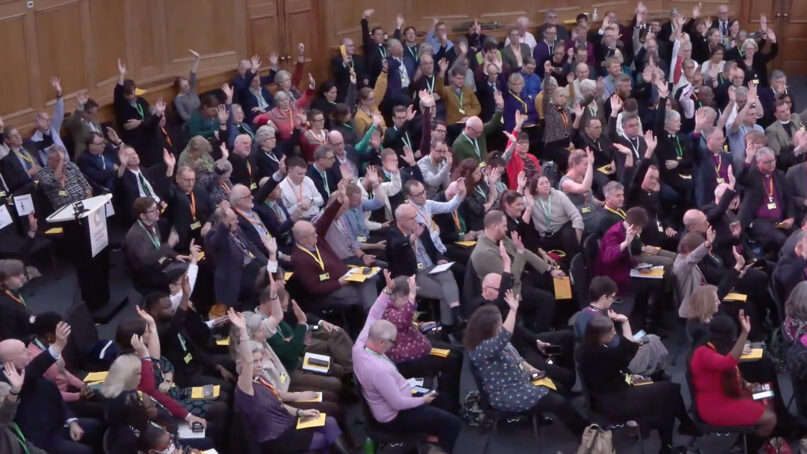LONDON (RNS) — The Church of England will test-run stand-alone services for blessing same-sex couples after its ruling body, the General Synod, voted to move ahead with implementing special prayers of thanks and dedication for gay couples. The vote to go ahead with the pilot program followed hours of emotionally charged debate about the church’s pastoral responsibilities toward gay people.
The synod’s vote on Wednesday (Nov. 15) follows the House of Bishops’ agreement last month to commend “Prayers of Love and Faith,” a collection of prayers and readings for same-sex couples, for use in existing church services. The bishops also approved the prayers as the basis for stand-alone services.
Two days of debate began with synod members — bishops, clergy and lay representatives — considering a motion put forward by the bishop of London, the Rt. Rev. Dame Sarah Mullally, the third most senior bishop in the Church of England, in which she highlighted the uncertainty and tensions in the church over the issue and especially over the content of prayers for same-sex blessings.
Thirteen amendments were offered to her motion, from those who wanted to recognize further the distress the issue had caused to gay people to those who wanted to abandon the work on same-sex blessings altogether.
On Wednesday, the synod voted to accept an amendment from Steven Croft, the bishop of Oxford, to test stand-alone services, a significant move that some synod members pointed out might affect the “optics” surrounding the blessings, suggesting that they are weddings in all but name.
The Croft amendment passed the House of Laity by just one vote.
Support for the prayers for same-sex blessings came from the Church of England’s leaders, the archbishops of Canterbury and York, at the start of the special session of General Synod.
But tensions remain so strong that the archbishop of York, Stephen Cottrell, told the synod on Tuesday that the disagreements “appeared to be stretching us to breaking point.” But he also said that “there should be no place for homophobia in our church.”
Those who opposed the experiment with the prayers for same-sex blessings pointed out that once they had been tried, they would be hard to retract. “Trial services could never be withdrawn,” said the bishop of Chichester, the Rt. Rev. Martin Warner. That would be too divisive, he said, while saying the idea of accommodating same-sex couples needed more study.
“Like all doctrine, the doctrine of marriage is practical, but it is more than that,” he said. “It shows that what we do now is linked to eternal reality. How we use our bodies matters — they are temples of the Holy Spirit. This is more than devotion. The rationale for using these prayers needs far more elucidation.”
The vote is not binding across the rest of the Anglican Communion but it will be noted with interest, especially among those who have been highly critical of Archbishop of Canterbury Justin Welby for being too tolerant of gay believers.
Meanwhile, it was received with relief by Church of England members who back reform, many of whom feared that other amendments to Mullally’s motion would delay or even halt progress on the decision made by a synod in February to press ahead with prayers of blessing. Continuing conflict between conservative and liberal groups had already kept that decision from being implemented.
Mullally, allowing that “we are in a period of uncertainty, and that many in the church on all sides feel pain at this time,” said the current synod should encourage the House of Bishops to continue its implementation.
Getting the prayers to be permanently authorized will be a harder task, as that will require a two-thirds majority in synod. They received 52% of the vote Wednesday.
Mullally and the bishop of Winchester, Philip Mounstephen, who have been co-chairing the Living in Love and Faith steering group, said in a statement, “The truth is — and as we have seen again today — that the Church of England is not of one mind on questions of sexuality and marriage.
“Yet we must also reflect on all that we have heard from Synod — from across the whole spectrum — and redouble our efforts to find a space where we can live with our current disagreements because we believe that is what God is calling us to do.”
Several speakers during the lengthy debates described their own experiences of being gay in the Church of England. “I realized what it means to be queer, the way you love beyond gender, the shame I’d absorbed about me, but Jesus showed me how to be ourselves,” said the Rev. Chantal Noppen, from the Diocese of Durham, telling the gathering, “We need to make progress.”
Paul Ronson, who said he had been a church organist for 45 years, said: “We’ve all had enough. This has gone on long enough. Nothing can separate me from the love of God, I say to those who say I am going to hell.”
The prayers to be tested for same-sex couples are below:
A Prayer of Dedication
God of grace,
whose beauty, ever ancient, ever new, sings through all creation:
enfold your servants N and N
with your encouragement, hope, and love. Fill them with the grace to rejoice always
in their love for one another,
and to follow the Way of holiness and hope revealed in your Son Jesus Christ.
All Amen.
A Prayer of Thanksgiving
Gracious God,
from love we are made
and to love we shall return.
May our love for one another
kindle flames of joy and hope.
May the light and warmth of your grace inspire us to follow the Way of Jesus Christ, and serve you in your Kingdom,
now and for ever.
All Amen.





